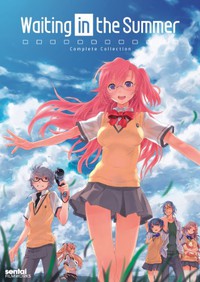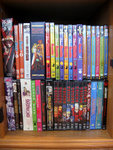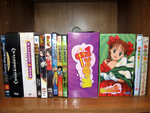Shelf Life
Destiny's Child
by Bamboo Dong,

Penguindrum - Collection 2 BD
Steins;Gate part 1 BD+DVD
Rental Shelf
Waiting in the Summer complete collection DVD
Perishable
Nothing this week
Welcome to Shelf Life.
 To say that Penguindrum is weird may be the understatement of the century. It is, indeed, weird, but that word alone doesn't give it credit for everything else that it is—artistic, thought-provoking, intriguing, and simultaneously hopeful and cynical. It's a show that requires multiple viewings—one time to absorb all the story elements, another time to distinguish between reality and metaphor, and another time or two to process it all. Along the way, you might notice aspects of the artwork you didn't have time to notice before. You'll probably also pick up on symbols that you completely missed the first time around.
To say that Penguindrum is weird may be the understatement of the century. It is, indeed, weird, but that word alone doesn't give it credit for everything else that it is—artistic, thought-provoking, intriguing, and simultaneously hopeful and cynical. It's a show that requires multiple viewings—one time to absorb all the story elements, another time to distinguish between reality and metaphor, and another time or two to process it all. Along the way, you might notice aspects of the artwork you didn't have time to notice before. You'll probably also pick up on symbols that you completely missed the first time around.For those expecting a thematic continuation of the first half of Penguindrum, you might be surprised. The show takes a rapid turn away from the Ringo storyline and enters a more magical, more supernatural realm (not that there was anything that natural about an alien hat that possessed teenage girls). Gone is the running narrative about Ringo's creepy stalker activities, and gone, also, is much of the talk about finding the “Penguindrum.” What does come to the forefront is flashbacks of the Sarin gas attack, which was brought up near the end of the first half of the series. It's been fictionalized, though, in order to accommodate the story of the Takakura siblings, their emotional fallout from the incident, as well as any ongoing involvement with the terrorist organization. Throughout the remaining episodes, though, it becomes increasingly fuzzy what is “real” and what is an extended metaphor. Some aspects were simply supernatural, like the presence of ghosts and alternate destinies. Still, even though Penguindrum begs for repeat viewings just to absorb it all, it's immensely intriguing. Even as I was confused by bits and pieces of the series, I found myself needing to watch more.
In the end, I was satisfied by the conclusion of the series. I still had questions remaining, but I felt the ending was appropriate. As I mentioned earlier, though, the second half of the series feels very different than the first half. The first half is a little more simple and straightforward—it's an eclectic mixture of cute and funny, mixed with creepy, and sprinkled with cynicism. It focused more on questions of fate and destiny, and the two very different schools of thought regarding their existence. The second half still relies heavily on destiny—but with the mysterious revelation of pink-haired, bishonen-looking Sanetoshi; the truth behind Momoka's diary; and questionable imagery like the child broiler, the cages, and the chisels—things definitely take a more surreal turn.
If I am to be completely honest, I'm not sure I fully understand every aspect of the series and its implications. There are themes and ideas that are easier to pull out than others, and some metaphors that are easier to string together than others, but I think there are definitely parts of the series that were either lost on me, or not meant to be overanalyzed. At the same time, this fuzziness is what draws me to the show. If you're anything like me, and you've consumed days, weeks, months worth of anime, then it takes something like Penguindrum to reignite that spark of curiosity inside you. Seldom is there a series that not only captivates my interest, but also the magpie center of my brain that responds to bright colors and pretty visuals, and makes me want to sit down and seriously mull over what I've just consumed.
The thing about Kunihiko Ikuhara's works is that there is rarely any excess. Things in his works happen for a specific reason, whether it's a stylistic choice to depict faceless crowds as cartoon stick figures, or have girls transform into vehicles. It makes watching his series an intellectual delight, and as you watch his creativity unfold, you can't help but strive to see if you can glimpse the world through his eyes. I think Penguindrum can easily be enjoyed on a surface level—it's bright, it's fun, it's wild—but I think more than any show I've seen in recent years, it begs to be rewatched.[TOP]
Another must-see that I watched was Steins;Gate, although it tickled my fancy a little less than Penguindrum.
 Here's my admission—I dragged my butt on watching Steins;Gate. When it first came out, I enjoyed the episodes that I watched, but I didn't get far enough into the series to really be gripped by it. Now, a couple months after the DVD and Blu-ray combo release date, I finally plowed through the first half of the series, and it is truly a fun show. For me, Steins;Gate felt a lot like a roller coaster—not in the emotional sense, but in the pacing sense. There are scenes of extreme velocity, where crazy, wild things happen—history is rewritten, characters disappear, the space/time continuum is split. Then there are scenes where hardly anything happens at all, like a trip to the grocery store, or a cutesy interlude where one of the girls makes a cute sound effect. And yet, things are always moving. Even in the slower scenes, the series is always one or two scenes away from something eye-opening.
Here's my admission—I dragged my butt on watching Steins;Gate. When it first came out, I enjoyed the episodes that I watched, but I didn't get far enough into the series to really be gripped by it. Now, a couple months after the DVD and Blu-ray combo release date, I finally plowed through the first half of the series, and it is truly a fun show. For me, Steins;Gate felt a lot like a roller coaster—not in the emotional sense, but in the pacing sense. There are scenes of extreme velocity, where crazy, wild things happen—history is rewritten, characters disappear, the space/time continuum is split. Then there are scenes where hardly anything happens at all, like a trip to the grocery store, or a cutesy interlude where one of the girls makes a cute sound effect. And yet, things are always moving. Even in the slower scenes, the series is always one or two scenes away from something eye-opening.The questionable hero of the show is the self-proclaimed mad scientist Rintaro Okabe. He operates a “lab” in an apartment above an electronics store, along with his friend Mayuri and the otaku computer whiz Daru. As the series progresses, more characters are added to the mix, and all are made honorary members of the lab. Their main project right now is a tinkered-with microwave contraption that turns bananas into blobs of gel, but they quickly discover that they can also use it to send short emails to the past. Once the past has been changed, though, the only one who remembers both timelines is Rintaro. Because of their initial success with the microwave, they're also being targeted by SERN (Get it? Like CERN?), an international organization that's been doing time travel research of their own.
As a scientist, what makes Steins;Gate appeal to me is its lack of science. It's refreshingly open-ended and vague, only rarely dropping in chunks of technobabble. This keeps the series moving forward, using drama and suspense to propel the action rather than heavy details, which have a tendency to get in the way when they veer too far off what's physically possible. As a result, Steins;Gate strays a bit closer to fantasy than science fiction, but it still retains a certain geeky charm that I think will appeal to technology hobbyists.
My appreciation of the open-endedness of the series, though, is also one of my issues with it. Because we see everything through Rintaro's eyes, we only know what he knows. Meaning, if the past is changed, we only see the aftereffects—Akihabara can be drastically changed, or a character's identity can be completely changed. Just like Rintaro, though, we're not privy to the details of Why. Even though he (and the audience) retains memories of the previous time line, he has no memory of the new timeline. Once the ripples from the “butterfly effect” get to be too big, the series starts to lose its grasp on itself. Why does Faris want to remove moe from Akihabara, for instance? By not giving us the reasoning behind this move, or seeing the changed timeline prior to the event, it removes large chunks of characterization. Because of this, some of the characters can seem shallow, because we're not privy to the motivations behind their actions.
I think Steins;Gate is a ton of fun, but it's not without its pros and cons. On the upside, its portrayals of time travel and the dangers of changing history are intriguing, and it makes for riveting television. On the downside, character development takes a hit in the process. With the exception of Rintaro, I don't really feel like I know any of the characters that well. When history changes, I know them even less. Still, I'm very eager to see how the rest of the series will unfold, and I am looking forward to checking out the last half of the series in a couple weeks.[TOP]
Turning my sights to something more romantic, the last series I checked out this week was Sentai's release of Waiting in the Summer.
 For starters, let's state the obvious, which is that Waiting in the Summer will definitely remind older viewers of Please Teacher!, as the two share similar staff members (the writer and the character designer), similar designs for the main characters, and even a similar premise. However, Waiting in the Summer quickly differentiates itself from its predecessor, not only in terms of story, but also in the way that it carries itself. This series is more earnest, more melancholic, and portrays teenage love in a way that is both heart-breaking and realistic.
For starters, let's state the obvious, which is that Waiting in the Summer will definitely remind older viewers of Please Teacher!, as the two share similar staff members (the writer and the character designer), similar designs for the main characters, and even a similar premise. However, Waiting in the Summer quickly differentiates itself from its predecessor, not only in terms of story, but also in the way that it carries itself. This series is more earnest, more melancholic, and portrays teenage love in a way that is both heart-breaking and realistic. Kaito is a film enthusiast who wants to make a movie with his friends. One day, on the way home from school, he experiences something supernatural he can't quite explain, but soon after, the school gets a new student. Her name is Ichika, and she's the hot, buxom red-head that all the boys are fascinated with. We learn that she's an extraterrestrial, but as far as the other characters are concerned, she's just Kaito's new love interest. Unfortunately, this doesn't sit well with childhood friend Kanna, whose attempts to accept the new girl and the blossoming relationship between Kaito and Ichika are commendable, but painful to watch. Meanwhile, summer break is here, and this provides the perfect opportunity for all of Kaito's friends to help him make his movie.
The beautiful thing about Waiting in the Summer is its honest, and often awkward, portrayal of teenage love. There's a frankness about the characters' interactions that makes them relatable. Blessedly, it's also a vast difference from the usual shonen harem stuff that's taken over the market. The women aren't clawing each other to win over the affections of the main character. Confessions are made, rejections are heard, and the characters who lose the battle of love are left to tearfully lick their wounds and move on. Kanna's unrequited love for Kaito is especially tenderly written, and we watch her move through familiar stages of worry, heartache, feigned acceptance, depression, and eventually recovery. The other characters go through similar journeys of their own, and it's a delight to watch.
But, wait—Ichika is an alien, remember? And it turns out, that's the worst part of the series. By far. For what reason does she need to be an alien? To eventually have to leave the planet? In that case, why not just make her a foreign exchange student, or have her father be transferred overseas? Why an alien? It seems that even the writers weren't sure. The show hits its stride halfway through the series, and we're treated with several episodes of solid, romantic drama. Character relationships are broken and re-forged; love is sealed with kisses, or torn apart. And then, oh yeah, Ichika is an alien. So the last few episodes are a tornado of ridiculousness, in which spaceships and alien drones careen around the countryside, shooting lasers at people and tearing up the streets. For what purpose??? It completely takes you out of the series, and rather than allowing the series to wrap up naturally, it's force-fed a conclusion of high-octane chase scenes and alien nonsense.
Ultimately, I think the alien subplot ruins Waiting in the Summer. Here you have this incredible series about love and heartbreak, and what it's like being on either side. And then you have this goofy, half-cooked alien story that feels tossed in at the last second. It adds nothing, but takes away a lot. If I were to watch this series again, it would only be the middle part. The beginning and end are better forgotten, which is a true shame. [TOP]
Alright, that's my time. See you next week for the Stream!

This week's shelves are from Jessica:
"My name is Jessica and I live in Utah. I've been an anime fan coming on twelve years now, but I've only been purchasing for the last six. I would like to throw some pictures of my collection your way. My first purchase was InuYasha (as if you couldn't tell by the row of DVDs on my floor!) and my most meaningful purchase so far has been the 2nd season of Kodocha - subbed of course. I'm just glad that my imported set works with my Blu-Ray player!
I have some manga, and I also like to collect anime stickers, pens, shitajiki, figures, and posters. "





Thanks for showing us your collection! There's some great stuff in there!
Want to show off your stuff? Send your jpgs to [email protected]. Thanks!
discuss this in the forum (31 posts) |